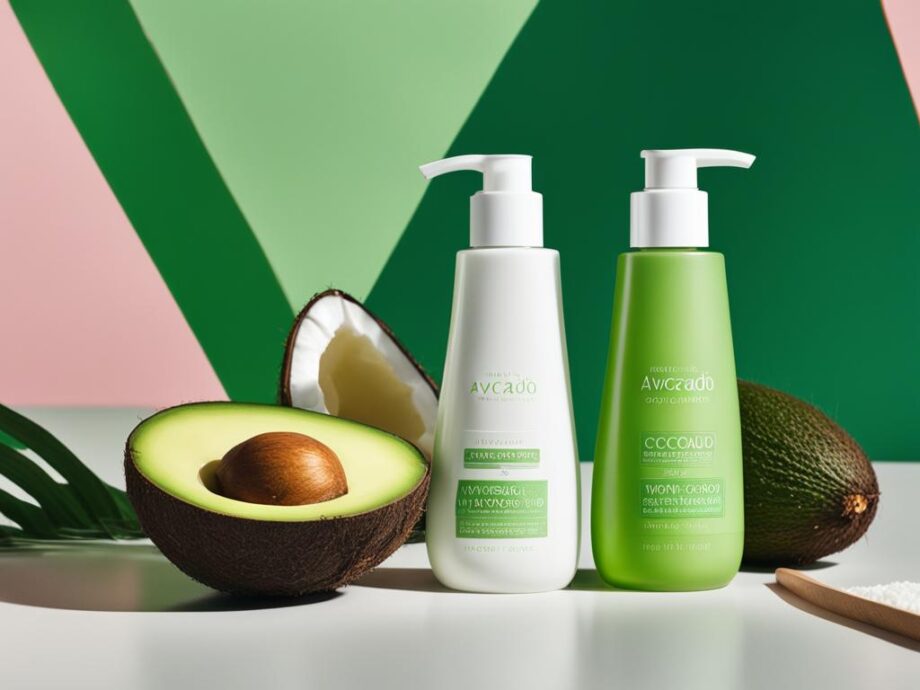Are you looking for the perfect natural moisturizer to enhance your skin’s radiance? Look no further than avocado oil and coconut oil. Both oils offer numerous benefits for your skin, leaving it hydrated, nourished, and glowing. But which one is the best choice for you? Let’s dive into this comparison of avocado oil vs coconut oil to find out.
Avocado oil is packed with skin-nourishing goodness. It is rich in antioxidants that can help combat free radicals and protect your skin from damage. Additionally, avocado oil is known for its excellent hydrating properties, making it a top choice for dry or dehydrated skin types.
On the other hand, coconut oil is widely celebrated for its moisturizing capabilities. Its natural fatty acids help to lock in moisture and keep your skin supple and smooth. Not only that, but coconut oil also possesses antibacterial and anti-inflammatory properties that can soothe and heal various skin conditions.
Now, let’s compare avocado oil and coconut oil head-to-head. Consider your skin type and the desired level of absorption when making your decision. Keep in mind that everyone’s skin is unique, so what works for others may not work for you. Take some time to understand your skin’s needs and preferences to select the perfect natural moisturizer.
Key Takeaways:
- Avocado oil is rich in antioxidants, making it beneficial for protecting the skin from damage.
- Coconut oil is highly moisturizing and can help lock in moisture for smooth and supple skin.
- Consider your skin type and absorption preferences when choosing between avocado oil and coconut oil.
- Both oils offer unique benefits, so understanding your skin’s specific needs is crucial.
- Select the natural moisturizer that works best for your skin’s individual requirements.
Understanding Avocado Oil for Skin
Avocado oil has gained popularity in recent years for its remarkable benefits for the skin. This natural oil is known for its moisturizing properties and is packed with antioxidants that nourish and protect your complexion, leaving it looking healthy and radiant.

One of the key benefits of avocado oil for skin is its exceptional hydration. The oil is rich in essential fatty acids, such as oleic acid, which helps to lock in moisture and prevent dryness. This makes it a great choice for those with dry, flaky skin or anyone looking to maintain a well-hydrated complexion.
Additionally, avocado oil is loaded with antioxidants, including vitamins A, C, and E. These antioxidants help to combat free radicals that can cause damage to the skin, leading to premature aging and dullness. By incorporating avocado oil into your skincare routine, you can effectively protect your skin from environmental stressors and promote a youthful glow.
“Avocado oil is a true skincare treasure. Its hydrating properties and antioxidant content make it a go-to choice for a natural, healthy complexion.” – Dr. Alicia Jones, Dermatologist
Furthermore, avocado oil is easily absorbed by the skin, making it suitable for all skin types, including oily and sensitive skin. Its lightweight texture allows for quick penetration into the skin without leaving a greasy residue. This makes it an ideal option for those who want the benefits of an oil without feeling heavy or clogging pores.
The Benefits of Avocado Oil for Skin:
- Deep hydration for dry, flaky skin
- Antioxidant-rich formula to protect against free radicals
- Lightweight and easily absorbed, suitable for all skin types
| Benefit | Avocado Oil | Coconut Oil |
|---|---|---|
| Hydration | ✓ | ✓ |
| Antioxidants | ✓ | |
| Suitable for all skin types | ✓ |
Exploring Coconut Oil for Skin
When it comes to natural skincare, coconut oil is a popular choice known for its numerous benefits. It is a versatile ingredient that can moisturize your skin, while also providing antibacterial and anti-inflammatory properties.
Coconut oil has long been recognized for its moisturizing effects on the skin. It contains fatty acids that help to lock in moisture, leaving your skin feeling hydrated and supple. Whether you have dry patches or overall dry skin, coconut oil can provide the much-needed moisture to restore its natural balance.
But coconut oil offers more than just hydration. It also possesses antibacterial properties that can help fight off bacteria and prevent infections. This makes it a great option for individuals struggling with acne or other skin conditions caused by bacteria.
“I have seen great improvements in my skin since I started using coconut oil. It keeps my skin moisturized and has reduced the inflammation caused by my acne.” – Mary Smith, skincare enthusiast
Furthermore, coconut oil has anti-inflammatory properties that can help soothe irritated and sensitive skin. It can calm redness, reduce swelling, and provide relief for conditions like eczema and psoriasis.
To reap the benefits of coconut oil for your skin, it is important to choose a high-quality, organic, cold-pressed coconut oil. This ensures that you are getting the purest form of the oil without any additives or chemicals that may irritate your skin.
How to Use Coconut Oil for Skin
Coconut oil can be used in various ways to enhance your skincare routine:
- As a moisturizer: Apply a small amount of coconut oil to your skin after cleansing and toning. Massage it gently into your skin until fully absorbed.
- As a makeup remover: Coconut oil can effectively remove makeup, even waterproof formulas. Apply a small amount to a cotton pad and gently wipe away your makeup.
- As a hair mask: Coconut oil can also nourish and condition your hair. Apply it to the lengths and ends of your hair, leave it on for a few hours or overnight, and then wash it out.
Remember, while coconut oil works wonders for many individuals, it may not suit everyone. It is always recommended to perform a patch test before using coconut oil extensively on your skin to check for any adverse reactions.
Now that you understand the moisturizing, antibacterial, and anti-inflammatory properties of coconut oil, let’s move on to the comparison between avocado oil and coconut oil in the next section.

Avocado Oil vs Coconut Oil: Which is Better for Your Skin?
When it comes to choosing the right oil for your skin, avocado oil and coconut oil are two popular options to consider. Both oils offer unique benefits and can be used as natural moisturizers, but understanding their differences can help you make an informed decision.
Suitability for Different Skin Types
One important factor to consider is how well the oil suits your specific skin type. Avocado oil is rich in fatty acids and vitamins, making it an excellent choice for dry or sensitive skin. Its nourishing properties can help hydrate and soothe the skin, providing relief from dryness and irritation.
On the other hand, coconut oil is known for its moisturizing abilities and is often recommended for normal to dry skin. It contains lauric acid, which has antimicrobial properties that can help fight bacteria and prevent acne breakouts.
Absorption Rate
Another aspect to consider is the absorption rate of the oil. Avocado oil has a slightly heavier consistency compared to coconut oil, which means it may take longer to absorb into the skin. This makes it an excellent choice for overnight treatments or for individuals who prefer a deep moisturizing experience.
Coconut oil, on the other hand, is lighter and absorbs quickly into the skin. It leaves a smooth and non-greasy finish, making it an ideal choice for daily use or as a base for makeup application.
Comparison Table: Avocado Oil vs Coconut Oil
| Factor | Avocado Oil | Coconut Oil |
|---|---|---|
| Suitability for Dry or Sensitive Skin | Yes | No |
| Moisturizing Abilities | High | Medium |
| Antimicrobial Properties | No | Yes |
| Absorption Rate | Slow | Fast |
Remember, the choice between avocado oil and coconut oil ultimately depends on your skin’s unique needs and preferences. If you have dry or sensitive skin and prioritize deep hydration, avocado oil may be the better option. If you have normal to dry skin and prefer quick absorption with antimicrobial benefits, coconut oil may be more suitable for you.
By understanding the differences between these two oils and considering your individual skin type, you can choose the oil that will provide the best benefits for your skin.

Conclusion
After carefully examining the benefits and properties of avocado oil and coconut oil for skin, it’s time to make the best choice for your natural moisturizer. It’s important to remember that everyone’s skin is unique, so what works for others may not work for you.
When selecting the right oil for your overall complexion, consider your skin’s specific needs and preferences. Avocado oil is known for its hydrating properties and the presence of antioxidants that can nourish and protect your skin. On the other hand, coconut oil is highly moisturizing and possesses antibacterial and anti-inflammatory properties that contribute to healthier skin.
Ultimately, the best choice between avocado oil and coconut oil for your skin depends on your individual needs and preferences. Experiment with both oils to see which one your skin responds to the most positively. Consult with a dermatologist or a skincare professional for personalized recommendations.
